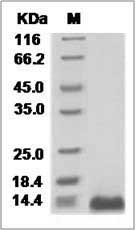-
Product Name
Mouse CXCL16 / SR-PSOX (His Tag) recombinant protein
- Documents
-
Description
C-X-C motif chemokine 16, also known as Small-inducible cytokine B16, SR-PSOX, and CXCL16, is a single-pass type I membrane protein which belongs to the intercrine alpha (chemokine CxC) family. CXCL16 exists in transmembrane and soluble forms. The transmembrane form acts as a scavenger receptor for oxidised LDL whereas the soluble form acts a chemoattractant for mainly CD8+ T cells. CXCL16 is a protein which shares pattern recognition receptor functions, relevant for adhesion and phagocytosis of bacterial products, with the properties of an adhesion molecule and inflammatory chemokine. CXCL16/SR-PSOX is an interferon-gamma-regulated chemokine and scavenger receptor for oxidized low-density lipoprotein that is expressed in atherosclerotic lesions. Proteolytic cleavage of membrane-bound CXCL16 releases soluble CXCL16, which may promote migration of effector T cells and augment a proatherogenic inflammatory response. CXCL16/SR-PSOX can be a potential player in atherogenesis. Enhanced expression of CXCL16 has been demonstrated in atherosclerotic plaques and several properties have been attributed to CXCL16 that could influence the atherosclerotic process. Following in vitro studies suggested that as an adhesion molecule CXCL16/SR-PSOX might mediate T-cell adhesion to the endothelium, as a chemokine-drive T-cell migration, stimulate cell proliferation and elicit inflammatory phenotype in smooth muscle cells (SMC) and, finally, as a scavenger receptor-mediate uptake of atherogenic lipoproteins by macrophages and SMC. CXCR6 and its ligand CXCL16 in regulating metastasis and invasion of cancer. CXCR6 and CXCL16 are up-regulated in multiple cancer tissue types and cancer cell lines relative to normal tissues and cell lines. In addition, both CXCR6 and CXCL16 levels increase as tumor malignancy increases. Thus, CXCL16 and CXCR6 may mark cancers arising in an inflammatory milieu and mediate pro-tumorigenic effects of inflammation through direct effects on cancer cell growth and by inducing the migration and proliferation of tumor-associated leukocytes.
-
Protein name
C-X-C motif chemokine 16
-
Protein short names
0910001K24RIK; SRPSOX; CXCLG16; BB024863; AV290116; CXCL16V1; CXCL16V2; SR-PSOX; DN-491F10.6; B2B498CLO; CXCL16; ZMYND15
-
Uniprot ID
Q8BSU2
-
Gene Name
Cxcl16; Srpsox
-
Source/Expression Host
Yeast
-
Expression Plasmid/cDNA
A DNA sequence encoding the mouse Cxcl16 (NP_075647.3) (Asn27-Pro114) was expressed with a polyhistidine tag at the C-terminus.
-
Protein Species
Mouse
-
Molecular weight
The recombinant mouse Cxcl16 consists of 98 amino acids and predicts a molecular mass of 11.3 kDa.
-
Purity
> 95 % as determined by SDS-PAGE.
-
Validations

Mouse CXCL16 / SR-PSOX Protein (His Tag)
Related Products / Services
Please note: All products are "FOR RESEARCH USE ONLY AND ARE NOT INTENDED FOR DIAGNOSTIC OR THERAPEUTIC USE"
